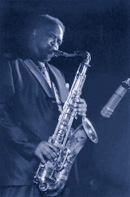
|
|
|
|
|
|
Photo Credit: Gérald Beckers |
Houston Person
Tenor saxophonist Houston Person is one of the most soulful jazz players on the scene today. A musician who pays close attention to melody and has a deep sense of the blues, Person extends the tradition of Gene Ammons and Eddie "Lockjaw" Davis and keeps the soul-jazz flames alive. On this edition of Billy Taylor's Jazz at the Kennedy Center, Person nestles comfortably in Dr. Taylor's trio and provides insightful comments on his jazz career. The show begins with a Latin-tinged performance of Clare Fischer's "Morning." Dr. Taylor welcomes Person, then they commence a gently swinging rendition of Horace Silver's "Juicy Lucy." After enthusiastic applause, Person talks about his childhood days in Florence, S.C. Person tells Dr. Taylor that his only distinction in music was between "good" and "bad" and that living in the South allowed him to check out country music as well as the blues. Given that Duke Ellington also used the "good" and "bad" distinction, Dr. Taylor naturally asks Person if he listened to Ellington during his childhood. "Most definitely," Person responds. He explains that when he listened to Ellington, he heard dance music as well as jazz. The conversation about Ellington leads to a sparkling rendition of "I Don't Get Around Much Anymore." During the Q&A portion of the show, an aspiring musician from Georgia asks Person for advice. Person imparts the importance of practicing, staying focused, and getting a full education. Dr. Taylor chimes in and asks Person about his musical influences. The saxophonist reveals that Illinois Jacquet was his main influence, but he also listened to Stan Getz, Joe Holliday and Ben Webster. Dr. Taylor then inquires about Person's experiences playing with gospel great Johnny "Hammond" Smith and the connections between gospel and soul-jazz. Considering that the organ is usually the center of both musics, Person says that it's ultimately, "all of God's music." He then joins Dr. Taylor's trio in a shimmering reading of Tadd Dameron's "If You Could See Me Now." The broadcast returns to the Q&A format and an audience member asks Person what inspired him to play music. Person says that he always listened to jazz, even before he started playing, and that he was blessed to have parents who bought him a saxophone and encouraged his musical development. After the conversation reveals Person's strong love for the blues, Person and Dr. Taylor close the show with a slow burning rendition of "Easy Walker."
|
|
| |
